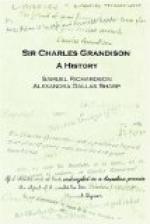The villains, one of the men said, knew who they were, and what the provocation was; which had merited a worse treatment than they had hitherto met with. You, sir, proceeded he, seem to be a man of honour, and temper: we are men of honour, as well as you. Our design, as we told you, was not to kill the miscreants; but to give them reason to remember their villainy as long as they lived; and to put it out of their power ever to be guilty of the like. They have made a vile attempt, continued he, on a lady’s honour at Abbeville; and, finding themselves detected, and in danger, took roundabout ways, and shifted from one vehicle to another, to escape the vengeance of her friends. The gentleman, whose horse you held, and who has reason to be in a passion, is the husband of the lady. [A Spanish husband, surely, Harriet; not a French one, according to our notions.] That gentleman, and that, are her brothers. We have been in pursuit of them two days; for they gave out, (in order, no doubt, to put us on a wrong scent,) that they were to go to Antwerp.
And it seems, my dear, that Sir Hargrave and his colleague had actually sent some of their servants that way; which was the reason that they were themselves attended but by one.
The gentleman told Sir Charles that there was a third villain in their plot. They had hopes, he said, that he would not escape the close pursuit of a manufacturer at Abbeville, whose daughter, a lovely young creature, he had seduced, under promises of marriage. Their government, he observed, were great countenancers of the manufacturers at Abbeville; and he would have reason, if he were laid hold of, to think himself happy, if he came off with being obliged to perform his promises.
This third wretch must be Mr. Bagenhall. The Lord grant, say I, that he may be laid hold of; and obliged to make a ruined girl an honest woman, as they phrase it in Lancashire. Don’t you wish so, my dear? And let me add, that had the relations of the injured lady completed their intended vengeance on those two libertines; (a very proper punishment, I ween, for all libertines;) it might have helped them to pass the rest of their lives with great tranquillity; and honest girls might, for any contrivances of theirs, have passed to and from masquerades without molestation.
Sir Hargrave and his companion intended, it seems, at first, to make some resistance; four only, of the seven, stopping the chaise: but when the other three came up, and they saw who they were, and knew their own guilt, their courage failed them.
The seventh man was set over the post-boy, whom he had led about half a mile from the spot they had chosen as a convenient one for their purpose.
Sir Hargrave’s servant was secured by them at their first attack; but after they had disarmed him and his masters, he found an opportunity to slip from them, and made the best of his way to the road, in hopes of procuring assistance for them.




